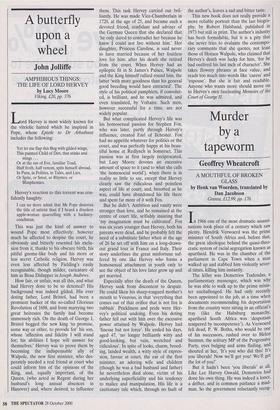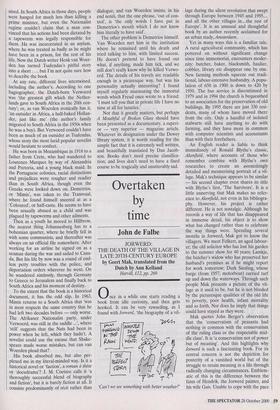Murder by a tapeworm
Geoffrey Wheatcroft
A MOUTHFUL OF BROKEN GLASS by Henk van Woerden, translated by Dan Jacobson Granta, £12.99, pp. 176 In 1966 one of the most dramatic assassi- nations took place of a century which saw plenty. Hendrik Verwoerd was the prime minister of South Africa and, before that, the great ideologue behind the quasi-theo- cratic system of racial segregation known as apartheid. He was in the chamber of the parliament in Cape Town when a man walked up and stabbed him violently sever- al times, killing him instantly. The killer was Demetrios Tsafendas, a parliamentary messenger, which was why he was able to walk up to the prime minis- ter unchallenged. He had only recently been appointed to the job, at a time when documents recommending his deportation from the country were sitting in an official's tray (like the Habsburg monarchy, apartheid South Africa was 'despotism tempered by incompetence). As Verwoerd fell dead, P. W. Botha, who would be one of his successors, rushed over to Helen Suzman, the solitary MP of the Progressive Party, eyes bulging and arms flailing, and shouted at her, 'It's you who did this! It's you liberals! Now we'll get you! We'll get the lot of you!' But it hadn't been 'you liberals' at all. Like Lee Harvey Oswald, Demetrios had done his own thing, He was indeed a loner, a drifter, and in common parlance a mad- man. So the government reluctantly recog- nised. In South Africa in those days, people were hanged for much less than killing a prime minister, but even the Nationalist regime couldn't claim that a man con- vinced that his actions had been dictated by a tapeworm was legally responsible for them. He was incarcerated in an asylum, where he was treated as badly as he might have been in a prison, for the rest of his life. Now the Dutch writer Henk van Woer- den has turned Tsafendas's pitiful story into a short . . . but I'm not quite sure how to describe the book At any rate, different lives intertwined, including the author's. According to one hagiographer, the Dutch-born Verwoerd was 'the greatest gift which the Nether- lands gave to South Africa in the 20th cen- tury'; or, as van Woerden ironically has it, `an outsider in Africa, a half-baked Hollan- der, just like me' (the author's family migrated to South Africa in the 1950s when he was a boy). But Verwoerd couldn't have been as much of an outsider as Tsafendas, whose story the most lurid popular novelist would hesitate to confect.
He was born in Mozambique in 1918 to a father from Crete, who had wandered to Lourenco Marques by way of Alexandria and Pretoria, and a young black maid. In the Portuguese colonies, racial distinctions and prejudices were rougher and readier than in South Africa, though even the Greeks were looked down on. Demetrios, or `Mimis', was taken to the Transvaal, where he found himself sneered at as a `Coloured', or half-caste. He seems to have been sexually abused as a child and was plagued by tapeworms and other ailments.
Then as a youth he moved to Hillbrow, the nearest thing Johannesburg has to a bohemian quarter, where he briefly fell in with some communists, and thereafter was always on an official file somewhere. After working for an airline he signed on as a seaman during the war and sailed to Cana- da. But his life by now was a round of end- less petty troubles with the police, and deportation orders wherever he went. On he wandered aimlessly, through Germany to Greece to Jerusalem and finally back to South Africa and his moment of destiny.
To the extent that the book is a historical document, it has the odd slip. In 1963, Mimis returns to a South Africa that 'was in most respects the same country that he had left two decades before — only worse. The Afrikaner Nationalist party, under Verwoerd, was still in the saddle ...', where `still' suggests that the Nats had been in power when he left, which they hadn't. A novelist could use the excuse that Shake- speare made worse mistakes, but can van Woerden plead that?
His book absorbed me, but also per- plexed me in my literal-minded way. Is it a historical novel or 'faction', a roman a these or 'docudrama'? J. M. Coetzee calls it 'a thoroughly successful blend of biography and fiction', but it is barely fiction at all. It consists predominantly of rich' rather than dialogue, and van Woerden insists, in his end note's, that the one phrase, 'out of con- trol', is 'the only words I have put in Demetrios's mouth which I do not know him literally to have said'.
The other problem is Demetrios himself. Van Woerden met him in the institution where he remained until his death and tried talking to him, with limited success. He doesn't pretend to have found out what, if anything, made him tick, and we still don't really know why he killed Verwo- erd. The details of his travels are readable enough in a picaresque way, but was his personality actually interesting? I found myself regularly murmuring the immortal words which Freud once wrote to a friend: `I must tell you that in private life I have no time at all for lunatics.'
Not that it greatly matters, but perhaps A Mouthful of Broken Glass should have been presented as a documentary, a superi- or — very superior — magazine article. Whatever its designation under the Dewey library system, it is worth reading for the simple fact that it is extremely well written, and beautifully translated by Dan Jacob- son. Books don't need precise classifica- tion; and lives don't need to have a fixed course to be tragically and unutterably sad.



























































































 Previous page
Previous page